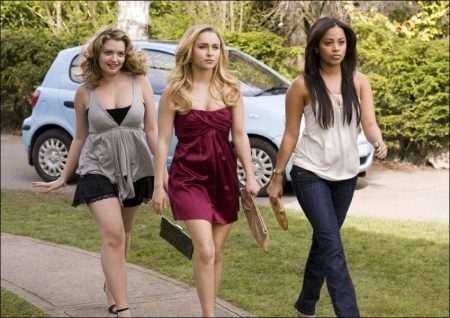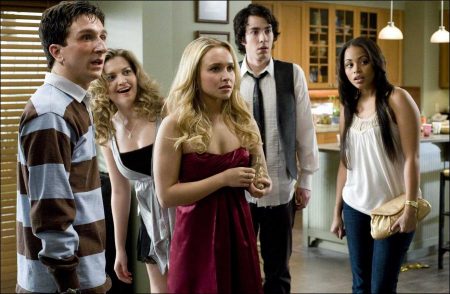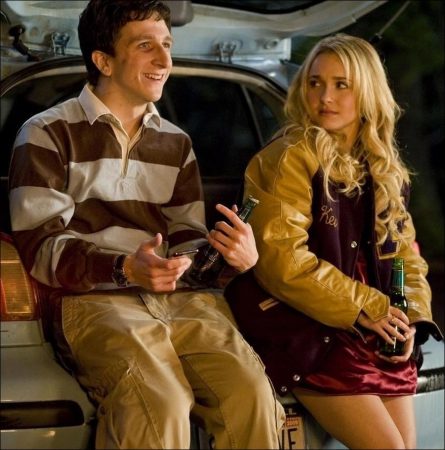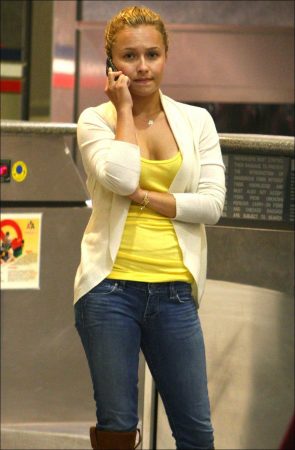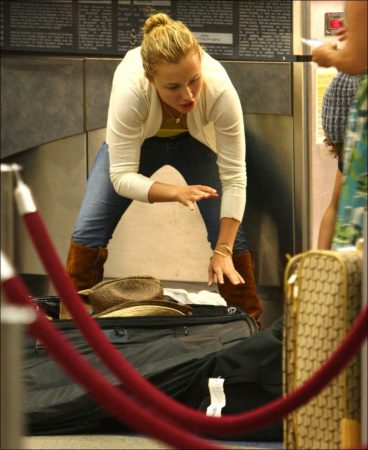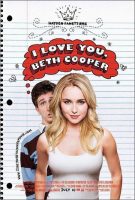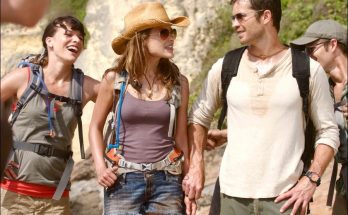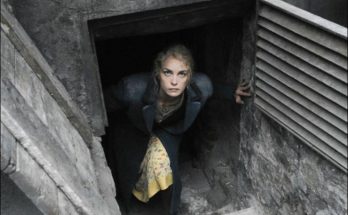Taglines: Still Love Me?
I Love You, Beth Cooper movie storyline. Buffalo Grove High School valedictorian Denis Cooverman (Paul Rust) has had quite an academic career…on paper, at least. Superlative student, conscientious young gentleman and patently obvious dork, Denis has played it safe and made it all the way to graduation day without ever having really experienced some of the joys of higher learning: breaking curfew, destruction of property, over-consumption of alcohol, fist fights, late nights, fast cars or faster women (actually, women of any sort). But all of that is about to change, and all by uttering five little words: “I Love You, Beth Cooper”.
Seems that Denis has been harboring a secret for six years, a chronic case of l’amour fou for Beth (Hayden Panettiere), one of the most popular girls in school, who sat in the desk just in front of him in multiple classes (God bless alphabetical order!). And thanks to his colorful best friend, Rich (Jack T. Carpenter), Denis has been goaded into telling the truth and declaring his love during his valedictory address – while also putting names to several other white elephants stampeding through the senior class.
His resulting embarrassment is short-lived, however, when The Trinity – Beth and her two best friends, super-bitchy Cammy (Lauren London) and super-easy Treece (Lauren Storm) – shows up to his and Rich’s ad hoc graduation night party. Unfortunately for Denis, Beth’s thick-necked, military hopeful boyfriend, Kevin (Shawn Roberts), also shows up, with two equally menacing, double-digit IQ friends in tow. When the inevitable can of “you insulted my woman!” whoop-ass is opened, Beth comes to the rescue, and whisks Denis, Rich, Cammy and Treece away in her beat-up Cabriolet. As the chase continues from sunset to sun up, Denis realizes that his little speech has given rise to one of the wildest, most eventful, most hilarious and most revealing nights of his life.
I Love You, Beth Cooper is a 2009 comedy film directed by Chris Columbus. It is based on the novel by Larry Doyle, with Doyle also writing the film’s screenplay. The film stars Hayden Panettiere and Paul Rust. In its opening weekend (July 10–12), the film grossed $4,919,433 at 1,858 theaters, which was enough for seventh place, and it finished its worldwide theatrical run with $15,821,907.
The Love Story Begins
Writer / producer / director Chris Columbus has always been a funny guy…funny, combined with a little sense of the bizarre thrown in, but funny nonetheless. Case in point: the megahit Gremlins, one of Columbus’ first screenplays, about a cute little furry creature that is accidentally hit with a little water and, before its cute little owner knows it, their cute little town is on the verge of destruction from a horde of small, not-so-cute, murderous monsters.
A few years later, Columbus helmed Heartbreak Hotel, his homage to Elvis, and worked with a young assistant director named Mark Radcliffe. They next collaborated on the global hit film Home Alone – accidentally left behind, a cute little kid defends his home from two would-be burglars – with Radcliffe as first assistant director/associate producer. Along the way, the two found they shared some of the same sensibilities when it came to filmmaking – funny, offbeat, creative – and began to collaborate on other projects. The romantic comedy Nine Months brought aboard producer Michael Barnathan, to Columbus’ writing/producing/directing and Radcliffe’s producing. Around that time, the three joined to form the company 1492 Pictures.
Many films later, from comedies to dramas to the screen adaptations of three of the most popular and widely read books in the world, Columbus found that he wanted to return to the director’s chair and began searching for his next project. When Barnathan noted, “You know, Chris, it’s a long time since you’ve been funny,” he realized that it had been a long time, indeed. Serendipitously, it was about that time that the first 100 pages of an as-yet-unpublished novel found its way to the offices of 1492 Pictures. Its title was I Love You, Beth Cooper. It was funny and offbeat, with a decidedly bizarre tilt to the story of a lovelorn dork named Denis and the object of his affection, Beth – with a motley entourage in tow – spending graduation night fleeing together from Beth’s vengeful boyfriend. It was love at first read.
Mark Radcliffe says, “One of Chris’ strengths as a director has always been his ability to fuse comedy and emotion, and Beth Cooper has plenty of both.” The author of the novel was Larry Doyle, whose ability to conjure the universal themes and pitfalls of the last days of high school belies his distance from the actual experience. The acutely observed and laugh-out-loud work was, according to Doyle, written as if he were in high school at the time (in the appropriate decade), and then the tale was embellished with the trappings of a post-millennial high school world. “The basic issues of being a teenager, figuring out who you are, where you fit, haven’t changed,” he says. “Out of the box, the characters look as if they’re going to act and behave in a certain way, but by the end of the movie, none of them is who you think they are.”
Two days after he began shopping the manuscript (as a 100-page sample), it had quickly reached the desks of some of Hollywood’s leading producers, where it was snatched up by the 1492 team. For Doyle, it was a dream, literally: “The story came to me in a dream, where I imagined that I was giving my high school speech and, in it, I declared my love for this girl that I had a crush on in seventh grade.”
Columbus was drawn to the project because of the universality of the characters’ experiences, and because it’s essentially a love story. He states, “Being a high school kid and dealing with those intense emotions – feeling love for the first time, questioning your identity, whether it’s your future or your sexual identity – for me is fascinating. We never have a more emotionally turbulent moment in our lives than our junior or senior year in high school. It just doesn’t get any more intense in terms of what we’re feeling about ourselves.”
For Columbus, heading I Love You, Beth Cooper harkened back to his development, casting and directing of the first Harry Potter film; it was a chance to work with and nurture a group of fresh young actors. Columbus explains, “When they’re just starting out, actors have a sense of excitement and hunger and an eagerness to be in the movie. That kind of energy fuels the production. There are no star turns. Everyone is there to work. You can never recapture your own youth, but you can certainly tap into that creative energy that fuelled you 15 or 20 years ago. That was what I was hoping to do with this movie.”
In describing Beth Cooper, Columbus says, “The film is about two people whose lives cross at a time when they’re about to make an enormous leap forward. Denis’ leap forward is toward a future that’s extremely bright and filled with the potential for success. Beth’s future is not so certain. In a way, she may have reached her pinnacle in high school. I found that to be an interesting moment, when these two come together.”
Lucky for the director, the perfect Beth Cooper – Hayden Panettiere, from the hit television series Heroes – had already expressed interest in the project. Her first meeting with Columbus made an immediate and happily positive impression on him: as soon as Panettiere entered the room, Chris turned to Michael Barnathan and said, “She’s a big movie star.”
What drew Panettiere to the film was the layered character of Beth, which afforded her the opportunity to turn her Heroes cheerleader / superhero image on its head: “Beth’s character goes through a definite change. In the beginning, you don’t know her, but you don’t like her, either. She’s the popular girl. She comes off a bit rough around the edges, but as you get to know her, you realize that it’s because she thinks the rest of her life, after high school, is going to be completely ordinary. She isn’t really good at anything. She doesn’t have a talent. She’s not particularly smart and she isn’t good in school. She isn’t going to get into a good college, and she can’t even afford to go to a community college…so high school is her world. That is where she thrives, and that’s all she knows.”
Columbus thought she was perfect for the role: “I knew she was a very gifted dramatic actress, but I had no idea she was so unbelievably talented in terms of comedy. She brings an incredible sense of comic timing.”
Panettiere explains the supposed disconnect between the story being told in I Love You, Beth Cooper and the way in which it’s told: “Every time I describe the plotline in the movie and how the characters come together for this journey, it always sounds a bit like a drama, even though it’s a very funny comedy. To me, that shows that it’s a comedy that really has a heart behind it. We’re basically running through the entire movie the whole night to get away from my psychotic boyfriend, who’s intent on destroying Denis because of what he said. But so much happens – we drive crazy, we drink a little, we end up in the woods, and then at this fancy graduation party, then a cabin on the lake – it’s really so funny. At one point, I drive a Hummer through the front of a house! And it all ends with cops. So that’s not such a drama, is it?”
To find the actor to portray Denis Cooverman, an extensive casting search was launched in Los Angeles, New York and Vancouver. The filmmakers found their Denis – Paul Rust – at an evening of improv at the Upright Citizens Brigade Theatre. Rust had moved from Iowa to Los Angeles with the goal of becoming a creator of comedy; at the most, he had hoped for a shot at being “the funny guy” in the ensemble. Landing a lead in a major motion picture was beyond his dreams.
“Paul is a both a very gifted verbal comedian and an incredibly gifted physical comedian, plus he’s an amazing actor,” says Columbus. “He’s naturalistic, honest and quite moving in his performance. Once you get to know Paul, you realize there’s so much depth and so much complexity within him, and he brings that to the Denis. I met a lot of actors who were very talented in a comedic way, but they didn’t have that soul. I love that combination. Paul is not the type of person you’d expect to get the girl at the end of the movie. He’s not the person you’d expect to be successful with women, yet Woody Allen was able to pull it off all those years, as did Chaplin, Groucho Marx, and now, Seth Rogen.”
“Denis is the sort of guy that was in everybody’s class,” observes Paul Rust. “He’s a dorky guy, who’s maybe a little shy and scared to live life. Then, one day, for some reason, he decides not to be shy and be completely open. He tells everybody that he loves Beth Cooper, and they’ve never even spoken, by the way. When he opens up, so does his life.”
Panettiere think Rust hits the nail on the head regarding his character, and takes the point even further when she says, “Denis Cooverman has a way of bringing out the truth in people. Throughout the movie, people become more honest because of him.”
“I think before you come of age you view things in very black-and-white terms,” counters Rust, “but as you get older, you realize it’s a little more complicated. Denis gets his eyes opened to the world. On an emotional level, Denis learns that being scared and being fearful of new experiences can keep you from having a more satisfying life. As far as Beth’s character is concerned, I think Denis gets her to see herself as a more worthy person than she was giving herself credit for.” If Beth is at the top of the social ladder at Buffalo Grove High, Denis and his sidekick, Rich, are near the bottom, probably just above the guys steadying the ladder. Larry Doyle says, “Denis and Rich, socially speaking, are just slightly above people in band in the hierarchy. And I think they’re just below the Mathletes.”
Cast in the part of the flashy Rich is Jack T. Carpenter, who shares his own take on the place he and Denis occupy in the scheme of all things high school: “The characters Paul and I play are not the complete losers. It’s just that we don’t quite fit in. It’s where I was in high school and that’s something that I definitely connect to.”
Rich is one of those great character combinations, then, of verbal acuity, physical comedy and a deep soul…think The Fool in several of Shakespeare’s plays. And who wouldn’t want to portray that?
Carpenter continues, “The thing I like most about Rich is that underneath all of his shtick and his movie quotes, there’s a real sincerity to the guy; he’s a real human being who’s had a really hard background. And he’s trying to get through it. He’s got these brand new shoes that he had to buy himself, because his father wouldn’t get them for him; it’s oddly symbolic, because he’s just trying to dance his way through life without concentrating too much on the bad stuff. Rich convinces Denis to tell Beth he loves her, because in the movie-influenced world of Rich, people who do that fall in love. And even though things don’t go that way, he just doesn’t concentrate on it. He goes with the flow, onto the next piece of bad advice he will give Denis.”
So if Rich is the one in Denis’ corner, in Beth’s, it’s the seemingly mismatched Cammy and Treece. Per the actresses portraying the pair – “The Laurens,” as they were called during production, Lauren London and Lauren Storm, respectively – the girls are Beth’s best friends because of their nonjudgmental attitude toward her.
Lauren London’s reaction to the script echoed the filmmakers’: “When I first read the script, I thought it was hilarious, and I had to be a part of it. I wanted to be Cammy, not just because she’s dry and bitchy, although that is fun, but because you can’t hate her. She’s likeable because she’s telling the truth. Most people have social filters, but Cammy doesn’t. She says what she thinks without thinking. It’s funny and dry, and it has a sting. But it stays funny because, inside, you know she’s a good person.”
Lauren Storm comments, “I think Cammy is dealing with a lot at home, and sometimes, the meanest people are the ones who hurt the most. I approached Treece as just that dumb girl – no judgment, I think it’s genetic – who thinks physical affection equals love. I guess you’d say she’s easy. I didn’t really want to think of her as a traditional `dumb blonde’ role, because when you do that, you’re judging the character before you play it. She may be dumb, but she’s perpetually naïve and happy, so I had to totally change my thinking.” (Storm’s thinking wasn’t the only thing that changed in order to play Treece-she gained nearly 15 pounds to screen test for the role, and eventually added another 15 pounds on top of that to give her the curves of Doyle’s character.)
It seems that everyone either had or found a personal connection to the characters they played, including the “heavy” of the piece, Shawn Roberts, who was cast as the possessive and excessively macho Kevin, Beth’s boyfriend. While Roberts never experienced the kind of bullying that Kevin enacts, he did at least have a glancing knowledge of the experience. Roberts relates, “I wasn’t ever really bullied, not so much. I mean, I had two older brothers, if that counts. And being older brothers, it’s kind of their job to do a little of that stuff. But, no, I’ve never had to experience the bullying thing, thank goodness, because I have seen how painful and destructive that kind of thing can be.”
Prior to the start of principal photography, the cast spent two weeks in Vancouver, rehearsing and getting to know each other. “We’re a bunch of extremely different individuals,” says Carpenter. “I don’t know if socially we would hang out in any other situation, but because we did, there was a really interesting, unique bond…sort of like in the movie.”
Columbus also employed the technique of having the actors prepare and write backstories for their characters. The finished pieces were read to the entire cast, establishing an even more familiar bond between their onscreen personas. And some even found that they had experiences in common with their characters. “When I first read the script,” says Rust, “I thought, `That’s funny, I made the same mistake when I was graduating, too!’ I was valedictorian of my class and when I gave my address, I used it as an opportunity to essentially give a kiss-off. I’d heard so many speeches where people had said that these were the best years of their lives. My speech asked, are they really? I listed all the awful things about high school, like break-ups and acne and teenage pregnancy. I was being a smartass and later, I was incredibly embarrassed and regretted everything I said.”
Characterizations weren’t the only things that came out of the rehearsal period. Despite its sweet title, I Love You, Beth Cooper calls for some serious fighting – mostly Kevin and his crew pounding on poor Denis. And the lead pounder, Shawn Roberts, had to work with veteran film fight choreographer, Bob Brown, along with co-star Rust and all of the stunt doubles, to ensure the ultimate safety during filming of the tussles.
Rust felt that his progression through the movie, as he withstands an everincreasing number of run-ins with Kevin and crew, warranted his performing as many of his own stunts as Columbus would allow. Roberts says, “Paul’s been such a trooper with us. There’s one fight, in the locker room, where I’m stomping down and missing his groin by inches. I wouldn’t trust a lot of people, doing that. But Paul and I worked with Bobby, and no worries.
Paul’s doing a lot of the stunts himself really helped the rest of the actors, because we work with him in a scene and establish a flow, as opposed to stopping and switching in the stunt guy. Don’t get me wrong – the stunt people are amazing, incredible and talented people. But they can’t deliver the lines with the zest that Paul brings. And that makes all of the other cast members take their game to the next level. I think it plays well, in the end, and it certainly makes the editor’s job a littler easier.”
Rust knew he could take the risks he did because of the close working relationship formed with his director. Rust comments, “Chris and I definitely collaborated on the character. I would have an idea about how I wanted to do something, and then I’d take it to Chris, and he’d give his two cents, and he made it better. When you take something to him, he doesn’t say, `Bad idea.’ Instead, it’s `Oh, I like that idea, and here’s something else we can do with it.’ Then he makes your idea better. I think that’s what a good director does; he helps you pinpoint what you’re trying to do and then give you a garden to grow in. Ha, yeah, I’m standing by that image: I’m not backing down. It’s a garden to grow in!”
I Love You, Beth Cooper filmed for nine-and-a-half weeks in Vancouver, British Columbia. The biggest challenge facing production: Filming a summer movie during springtime in the Northwest. And they encountered plenty of surprises, courtesy of Mother Nature, including a heavy snowfall. The book’s setting of a suburb near Chicago was shifted to Tacoma, Washington. This would not only allow for a little leeway in the weather, it also provided the opportunity to shoot on and around beautiful Lake Alouette, a glacial lake amid forested mountains an hour-and-a-half outside of Vancouver.
The filmmakers couldn’t find one high school that provided all of the settings they needed, so four schools were amalgamated (with film magic) to become the story’s Buffalo Glenn High School. Since Valli’s house, the scene of the disastrous party, is described in detail in the book, production designer Howard Cummings found just the right house just outside of Vancouver, which received a false bay window addition (which was duplicated on the interior set). This would allow the avenging Beth an ideal place into which she could crash Kevin’s Hummer. To contrast, an elegantly designed Craftsman bungalow was chosen to stand in for the Cooverman house.
The Hummer crash took around seven weeks to prep and execute, and was the single largest stunt in the film. The interior version of the bay window was constructed out of balsa wood and candy glass, to lower the chances of injury from flying, heavy debris. Additionally, the enormous vehicle collides with a buffet table full of food and dishware. When time came for the shot, all of the actual plates and silverware were switched out for plastic or acrylic, to lessen their harmful `missile’ potential. The sequence was filmed with five cameras.
Cummings declares, “It was a very exciting sequence for us with a lot of prep; it crosses a lot of different departments because it involves stunt people, special effects, along with the set decorating and lighting and others. All of this work was because of the complicated nature of trying to make something smash and fly through the air. It took a lot of coordination, and we wound up getting people’s opinions about how to do it different ways. And, of course, we needed to make it as safe as possible.”
The sometime comic nature of high school, plus the time spent trying to mature to graduate to the next stage of life, was a universal theme that struck a chord with all involved in making I Love You, Beth Cooper. For Hayden Panettiere, it brought to the surface fond memories of other motion pictures she grew up watching. She hopes, “Someday, maybe lines from this film will be quoted, like some from the John Hughes movies of the `80s. That’d be wonderful. Then you’d say, `Yeah, it’s from that old film I Love You, Beth Cooper, oh, I loved that film!’ One day, I’ll be old and gray and think, `Oh, I remember doing that film.’”
For Paul Rust, it was the opportunity to come to see someone in another, perhaps better, light that will stay with him: “Beth is somebody who Denis thought was like an angel. Then, after spending the evening with her, he sees that she is somebody who swears and drinks and makes offers to get beer. That’s an awakening, a way of opening yourself up. Like, `Oh, it wasn’t as simple as I thought.’ And I think that’s how Denis grows up.”
Larry Doyle wrote a novel and screenplay in which everybody, he believes, can recognize something of themselves: “This is the same story as it would have been when I was in high school. I knew that people my age – ancient people like myself, when they read the large print edition – would be able to empathize with it. But what was truly amazing to me is that teenagers ended up writing to me from all over the place, not because of some great insight I have into the way teenagers are today, but in the fact that being a teenager hasn’t changed. The basic stuff that everyone thinks about, and gets all worried about, like drugs or sex, those do change, or at least, the headlines about them change. But the basic issues, like figuring out who you are and where you fit, all teenagers have that exact same problem, no matter when they were teenagers. People would ask, `How did you know what it’s like to be a teenager?’ And all I said was, `Because I was one.’
I Love You, Beth Cooper (2009)
Directed by: Chris Columbus
Starring: Hayden Panettiere, Paul Rust, Jack Carpenter, Lauren Storm, Lauren London, Andrea Savage, Marie Avgeropoulos, Josh Emerson, Cynthia Stevenson, Brendan Penny, Shawn Roberts
Screenplay by: Larry Doyle
Production Design by: Howard Cummings
Cinematography by: Phil Abraham
Film Editing by: Peter Honess
Costume Design by: Karen L. Matthews
Set Decoration by: Mary-Lou Storey
Art Direction by: Sandi Tanaka
Music by: Christophe Beck
MPAA Rating: PG-13 for crude and sexual content, language, some teen drinking and drug references, and brief violence.
Distributed by: Fox Atomic
Release Date: July 10, 2009
Views: 180
